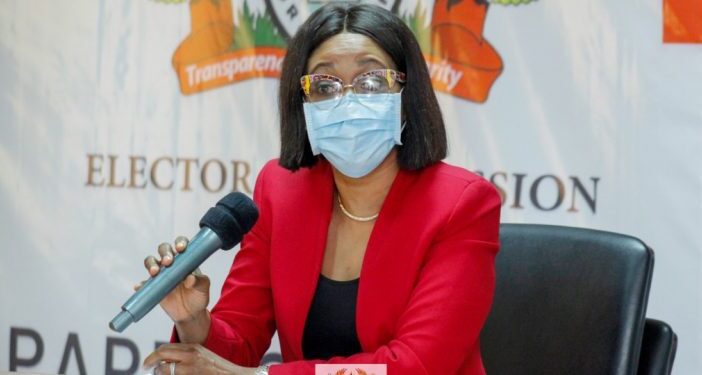The Electoral Commission (EC) is planning reforms which are to ensure the closure of polls in the 2024 general elections at 3 pm on election day instead of the usual 5 pm.
This will mean that no one will be admitted to the polling station to cast their ballot after 3 pm but if a voter happens to be in the queue after 3 pm, voting will continue until everybody in the queue has voted.
The move is to help pave the way for early counting of votes and declaration of results at the polling station and to avoid the inconveniences associated with the late close of polls.
The reform forms part of a 16-point proposal by the Electoral Commission (EC) that was agreed on by the Interparty Advisory Committee (IPAC) at the end of a two-day review workshop of the 2020 general elections in Accra.
The workshop was attended by over 10 political parties including the New Patriotic Party (NPP), People’s National Convention (PNC), Convention People’s Party (CPP), Great Consolidated Popular Party (GCPP), National Democratic Party (NDP) and the Ghana Union Movement (GUM).
The National Democratic Congress (NDC) did not participate in the workshop.
The NDC has already indicated that since it has issues with the 2020 general elections which to them, the EC has not resolved as of now, the party will therefore not participate in any IPAC meeting to review the 2020 elections.
The workshop reviewed issues and proposals relating to voter registration, exhibition exercise, filing of nominations, election security, collation of results as well as the successes and challenges that came with the 2020 elections.
New election time
A communique signed by the participants at the workshop and made available to Graphic Online indicated that the IPAC had agreed that casting of ballots in the 2024 general election should end at 3 pm instead of 5 pm.
This reform, when implemented, means that casting of ballots will end two hours earlier than the case has been since the 1992 elections which ushered in the 4th Republic.
IPAC also agreed that certified regional collated results should be announced by the Chairperson to reduce tension and suspicion.
“However, the Commission should state clearly the percentage of results yet to be released,” the communique added.
Registration
Over the years, the EC had conducted periodic voter registration involving the complete replacement of the voters register or limited voter registration.
The decision by the EC to compile a new voter registration for the 2020 general election was met by stiff opposition by some political parties and civil society organisations (CSOs) who see the exercise as a drain on the national coffers and waste of time.
At the IPAC meeting, the participants resolved to implement the continuous voter registration exercise to enable citizens who turned 18 years and those who had not previously registered to do so.
The participants agreed to set up a committee to deliberate on the implementation modalities for the continuous voter registration regime.
“Continuous voter registration should be implemented with proof of citizenship being limited to the use of Ghana Card and Ghana Passport since the guarantee system is often abused,” IPAC further agreed.
Exhibition
On voter exhibition, IPAC agreed to Introduce an all-year-round voter exhibition exercise through the use of technology (SMS shortcode).
Additionally, the participants agreed that the periodic mass verification exercise at exhibition centres should be maintained.
However, they said the EC must put in place a cut-off time for the continuous voter register exhibition to allow for the compilation of the register for voting on election day.
Filing of Nominations
Regarding the modalities for filing of nominations, IPAC agreed that the five-day period for filing of nominations introduced in 2020 should be maintained.
They also resolved that the period set aside for political parties to obtain signatures from their supporters before filing their nomination should be increased.
Additionally, IPAC agreed that the filing fees for female candidates and persons with disabilities (PWDs) should be reduced by 50 per cent to encourage them to put themselves up for election.
Aside from that, they said the period for the election campaign should be defined.
“It should commence after the nominations are filed,” the parties agreed.
Turning to special voting, the participants at the workshop said the current arrangement where the media, security services and election officials were allowed to apply and vote under the special voting period should be maintained until such a time that the process is fully entrenched.
Security
IPAC agreed that security around elections was the responsibility of the Ghana Police Service and not the EC.
Therefore, the workshop said the Ghana Police Service should arrange a periodic platform to engage IPAC and other Stakeholders on election security.
In the interest of accountability and deepening of democracy, IPAC urged the Ghana Police Service to provide updates on the 2020 elections malpractices and violence.
“Political parties and the media must show commitment to the democratic process and be mindful of their comments, as some of their statements have the tendency to provoke violence and inflame tensions and suspicions,” the communique added.
Further engagement
Although some proposals were tabled for discussion, IPAC agreed that there was a need for further deliberation on the way forward.
For instance, IPAC said the proposal for validation of voters during the exhibition to indicate that they will be available for the impending elections needed more discussion.
Also, the issue of reduction by 50 per cent the filing fee of female candidates and PWDs would be given further consideration.
in addition, a proposal for the refund of nomination deposits for all contesting candidates was to be discussed further.
Among other issues to be explored further is the recommendation to have data entry only at the constituency collation centre so as to reduce manual inputs at all levels and other technological suggestions to strengthen results collation.
Others are the introduction of results collation at the electoral area and affixing of ballot boxes to tables or stands in a bid to avoid ballot box snatching.
Successes
The Chairperson of the EC said the efficient handling of the electoral process had accounted for the
79 per cent voter turnout on election day.
She said value for money regimes by the EC had also saved the country GH522 million through the reduction of the cost per head from $13 to $7.70.
“For the first time in Ghana’s electoral history, the 2020 elections were fully financed by the Government of Ghana without any donor funding,” she said.
Mrs Mensa also said the deployment of technology to enable the citizenry to check their registration details all through to election day made the election a major success.
Challenges
While cataloguing numerous successes by the EC, MRS MENSA said there were some challenges that needed to be addressed.
She said the phenomenon of a high number of rejected ballots and manual verification of voters remained a huge challenge to grapple with.
The EC chairperson also said the registration of unqualified persons such as minors and foreigners as well as violence in some centres could not be swept under the carpet.




